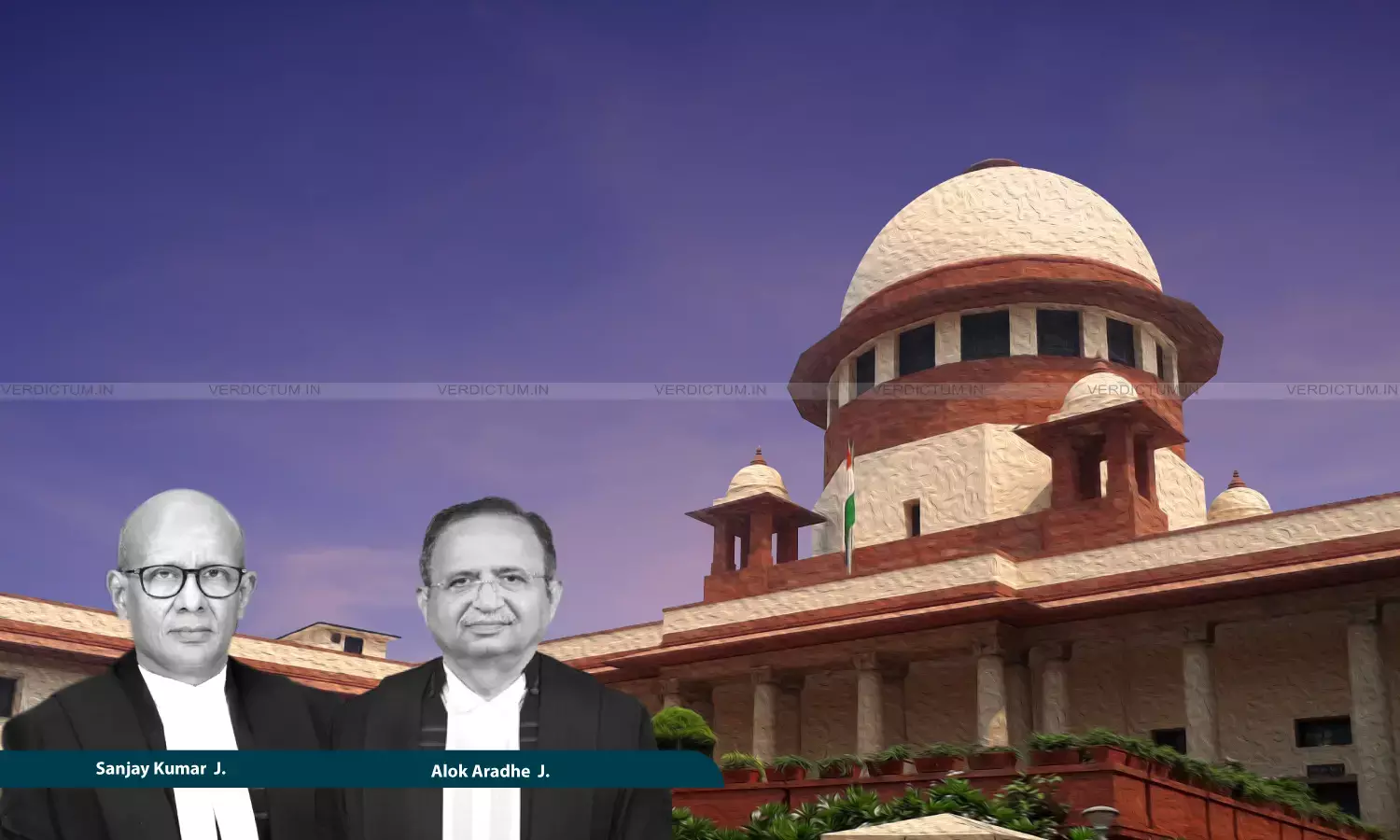Mere Delay In Filing Suit Does Not Negate Urgency U/S.12A Of Commercial Courts Act When Infringement Is Continuing: Supreme Court
The Apex Court clarified that in cases of continuing infringement of intellectual property rights, urgency under Section 12A of the Commercial Courts Act must be assessed in light of ongoing injury and the public interest in preventing deception.

Justice Sanjay Kumar, Justice Alok Aradhe, Supreme Court
The Supreme Court has held that where infringement of intellectual property (IP) rights is continuing, the mere lapse of time before initiating legal proceedings does not automatically extinguish urgency for the purpose of exempting the requirement of Pre-Institution Mediation Section 12A of the Commercial Courts Act, 2015.
The Apex Court was hearing an appeal challenging the orders of the Himachal Pradesh High Court, which had dismissed its commercial suit for non-compliance with the mandatory pre-institution mediation requirement under Section 12A.
A Bench comprising Justice Sanjay Kumar and Justice Alok Aradhe, while adjudicating the matter, observed that “in actions alleging continuing infringement of intellectual property rights, urgency must be assessed in the context of the ongoing injury and the public interest in preventing deception,” further emphasising that “mere delay in institution of a suit by itself, does not negate urgency when the infringement is continuing.”
Senior Advocate Gaurav Pachnanda appeared on behalf of the appellant, while Senior Advocate Shadan Farasat the respondents.
Background
The appellant, a producer of industrial fans sold under the brand Novenco ZerAx, had entered into a dealership agreement with the respondent company for the sale and distribution of its products in India. Following the termination of this agreement in 2022, the appellant discovered that the respondents were allegedly manufacturing and marketing deceptively similar fans through another entity, thereby infringing upon its intellectual property.
Upon confirming the infringement, the appellant filed a commercial suit before the Himachal Pradesh High Court seeking a permanent injunction and damages, along with an application seeking exemption from pre-institution mediation under Section 12A of the Commercial Courts Act.
The Single Judge dismissed the plaint on the ground that there was a delay in filing the suit, observing that the appellant had failed to demonstrate urgency. The Division Bench affirmed the order, holding that the delay defeated the plea of urgency and that the suit was not maintainable without mediation.
Aggrieved, the appellant approached the Supreme Court, arguing that the infringement was a continuing wrong and therefore inherently urgent, making pre-institution mediation impractical and contrary to the object of the Act.
Court’s Observation
The Supreme Court examined the scope of Section 12A of the Commercial Courts Act, which mandates pre-institution mediation in all commercial disputes unless the suit “contemplates any urgent interim relief.” The Bench observed that the requirement must be understood pragmatically, particularly in cases involving continuing infringement of intellectual property rights, where delay in filing does not dilute the immediacy of the harm.
Relying on precedents such as Patil Automation Pvt. Ltd. v. Rakheja Engineers Pvt. Ltd. (2022) and Midas Hygiene Industries Pvt. Ltd. v. Sudhir Bhatia (2004), the Court held that infringement cases are characterised by recurring causes of action, and each act of unlawful manufacture or sale renews the injury and the right to seek urgent relief.
The Bench further clarified that the concept of urgency cannot be reduced to the date of discovery or the time elapsed since, emphasising that “in actions alleging continuing infringement of intellectual property rights, urgency must be assessed in the context of the ongoing injury and the public interest in preventing deception.”
The Supreme Court also noted that compelling a party to undergo pre-institution mediation while infringement continues would “render the plaintiff remediless allowing the infringer to continue to profit under the protection of procedural formality”. Section 12A of the Act, the Court observed, “was not intended to achieve such kind of anomalous result.”
The Bench concluded that the urgency exception under Section 12A must be applied liberally in cases involving ongoing infringement, while stating that “the High Court has also failed to take into account that the present action is one of the continuous infringement of intellectual property.”
Conclusion
The Supreme Court held that the High Court had erred in dismissing the plaint for want of compliance with Section 12A. Accordingly, the orders of the Single Judge and Division Bench were set aside, and the appellant’s commercial suit was restored for adjudication on merits.
Cause Title: Novenco Building And Industry v. Xero Energy Engineering Solution Private Limited & Anr (Neutral Citation: 2025 INSC 1256)
Appearances
Petitioner: Senior Advocate Gaurav Pachnanda, with Advocates Pankaj Soni, Vineet Rohilla, Shradha Karol, Rohit Rangi, Debashish Banerjee, and others.
Respondents: Senior Advocate Shadan Farasat, with Advocates Abhishek Babbar, Harshit Anand, Yash S. Vijay, AOR, and Shikhar Aggarwal.


